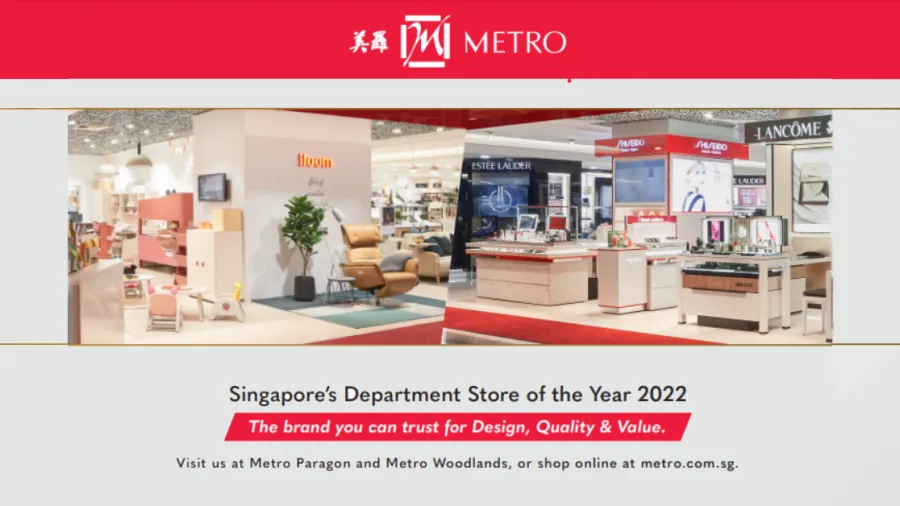
Metro Singapore: The Sustainable Department Store of Tomorrow
The department store is committed to promoting sustainable development that will positively impact supplier practices, employee welfare, and consumer health.
Sustainability in retail is no longer a trend to be considered at the surface of business actions. Shopify reported that nearly 50% of global consumers choose to buy from brands with a clear commitment to sustainability.
Since the retail industry undergoes the slow return of normality as measures ease, brick-and-mortar stores now place sustainability at the core of their business strategies, particularly in re-inventing stock and supply chain management.
With that, the shift to digital is also prompting retailers to re-evaluate the sustainability credentials of their products and overall brand to resonate with the demand of an increasingly wide range of customers.
Despite the COVID-19 pandemic, sustainability has remained at the forefront of Metro Singapore’s minds.
In May 2021, Metro signed the Retail Bag charge pledge with WWF to encourage shoppers by bringing their carriers through press ads, social media, and in-store reminders, promoting a more inclusive and sustainable future. Proceeds of the bag charge will go fully to WWF-Singapore's Plastic Action (PACT) initiative and WWF-Singapore's conservation efforts.
With these sustainable and environmental efforts, Metro said that they will continue to monitor, engage, and strengthen the partnership with WWF in 2022 as the majority of their shoppers have been supportive of the programme. Meanwhile, Metro has been driving the message ‘Metro For A Better Future’ since April 2021 in its store campaign. This is to ensure that the suppliers are also practising environmentalism and sustainability.
“We hope it will help to instil the importance of sustainability and have a positive impact on both our partners and customers. This is done by highlighting sustainable products, for example, products which use less water, fewer chemicals, are energy efficient or made from sustainable or recycled materials,” the company said.
By switching mostly to paper bags as a bagging option, Metro joined over 3,000 other establishments in the Say YES to Waste Less (SYTWL) initiative, which aims to reduce plastic usage and promote zero-waste behaviours in consumers last September 2021.
Apart from these initiatives, Metro also encourages shoppers to bring back clean and empty cosmetic bottles for reuse and recycling. Additionally, Metro also promotes greener options for house brand labels, from fashion to bedlinen, that are made of sustainable fabrics.
Also, in-door displays are recycled and cartons are used for customer deliveries and eCommerce fulfilment parcels to reduce waste. In addition, the store uses visual reminders and briefings to promote waste reduction, while its advertisements and product recommendations help to educate its consumer base.
The retail store has also launched an automated sales entry and stock transfers for e-commerce solutions that help drive Metro’s overall efficiency across the different processes. They opened an online store such as Lazada to help them improve their efficiency and productivity by using automated stock transfers and sales entry for their online store. With that, Metro gained 30,000 platform followers by the year 2021.
By removing the reliance on manual labour, Metro also said that they are now more focused on driving traffic online as well as improving customer experience.
Metro also credited their company’s success to their employees and continues to give them fair and equal job and training opportunities for all staff; regardless of gender, age, race, language, or religion.
“We provide them with the necessary training to ensure that Metro meets the customer expectations for that seamless shopping experience for both digital platforms and physical stores,” Metro said.
“The success of every company, especially in retail, is dependent on its people. Especially with the challenging retail environment, which further fuels inflation and supply chain disruption, there is a need for Metro to stay focused and agile,” it added.
As a result of these innovative efforts, Metro (Private) Limited won the Department Store of the Year - Singapore Award for two consecutive years in the Retail Asia Awards.
"Metro is honoured and humbled to celebrate this glorious milestone in winning the Retail Asia Awards 2022. Metro is home and Metro is Singapore, we will continue to champion Singaporeans across all ages and life phases both locally and globally," the company said.



















 Advertise
Advertise


